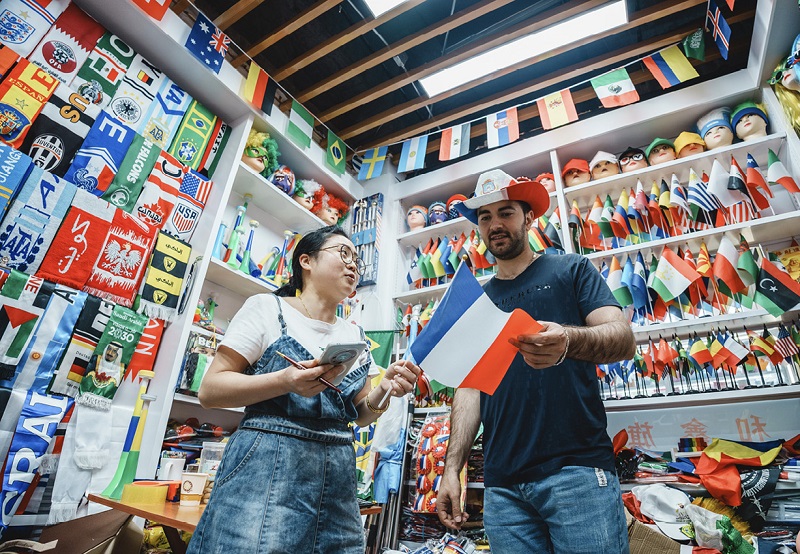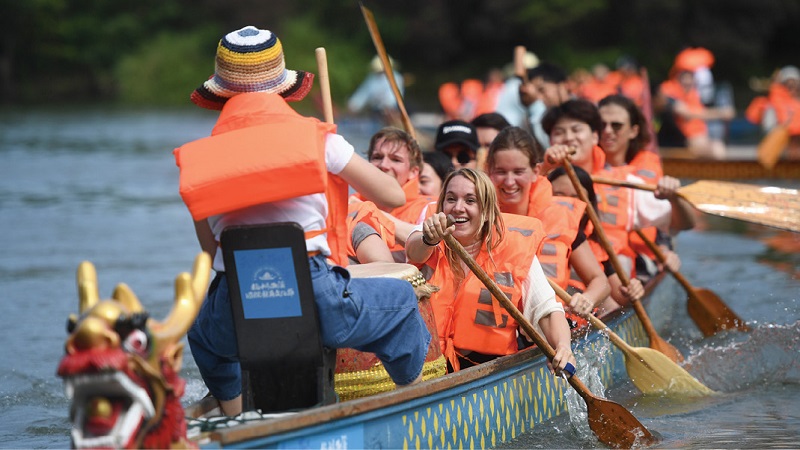
A businesswoman displays products with French elements in Yiwu, China’s hub of small commodities, in Zhejiang Province, on June 3, 2024.
Historically learning from the East spread to the West and Western learning spread to the East, creating a story of exchanges and mutual learning among human civilizations. These exchanges are primarily characterized by complementarity, non-equivalence and practicality.
China’s agrarian civilization gave inspiration for Europe's Enlightenment movement which influenced modern European culture. The industrial and commercial civilization of modern Europe reached China and swept it into the modernization process. Then in the 1960s, the establishment of diplomatic relations between China and France led to the normalization of relations between China and the Western world and opened the door for China to learn from advanced European technologies and promote its modernization drive.
The Eastern and Western civilizations represented by China and Europe respectively appreciated each other and learned from each other's strengths in an effort to mend their own weaknesses. Whether conducted actively or passively, the exchanges between them were diverse, non-equivalent, and asymmetrical. Moreover, these exchanges were based on the practical needs of both sides. As French political scientist and historian Alexis de Tocqueville said when criticizing Voltaire's fascination with China, the shaping of their respective images stemmed from necessity, and was aimed at addressing deficiencies and forming a certain image of each other.
In the new era, China and Europe have entered a phase of competitive exchange and mutual learning as they embrace the new age of digital and ecological civilization. As long as China and Europe open up to each other and engage in mutually beneficial cooperation, there will be no scope for block confrontation. As long as China and Europe remain open and seek win-win, deglobalization will not prevail. China-Europe relations hold great strategic significance in a world of changes and conflicts.

Expats from more than 10 countries try their hands at paddling the dragon boat at the Xixi Wetland in Hangzhou on June 9, 2024, the day before the Dragon Boat Festival.
China-Europe Civilizational Exchanges
Europeans often say that the only certainty in today's world is uncertainty. Where does this uncertainty come from? Since the beginning of modern times, we have talked about artifact-based civilization, institutional civilization, and spiritual civilization. Today both China and the West face new challenges in these three areas. For example, in the electric vehicle sector, some Western countries are disputing China’s subsidy policies and state support. In the field of data security, there are issues related to personal privacy protection, taken even to the cultural and civilizational level. This cyclical factor is causing the uncertainty in China-West relations.
At the same time, the global uncertainty also needs to be addressed by China and the West together, such as technological challenges related to artificial intelligence and blockchain decentralization. This requires thinking from two dimensions: how to avoid what the West calls intercivilizational competition in terms of artifacts, institutions, and culture/ethics, and how to address its threats to production activities, human life, and the way of thinking.
When Chinese President Xi Jinping met European Council President Charles Michel and European Commission President Ursula von der Leyen in Beijing last December, he said, “The China-EU relationship has strategic significance and implications for global peace, stability, and prosperity…We should not view each other as rivals just because our systems are different, reduce cooperation because competition exists, or engage in confrontation because there are disagreements." China sees the EU as a key partner for economic and trade cooperation, a preferred partner for scientific and technological cooperation, and a trustworthy partner for industrial and supply chain cooperation, he added.
China and Europe should support each other and find common ground in their respective efforts to advance Chinese modernization and European integration. This includes aligning the Belt and Road Initiative with the EU's Global Gateway strategy. As two major forces, markets, and civilizations, China and Europe have a significant role in creating a new form of human advancement, as well as in advancing digital civilization and ecological civilization.
For China, the EU is its most valued partner among all major countries and economic entities. This is because China's vision of modernization, including aspects like low-carbon living and a green economy, is not only inspired by Europe but also dovetails with the European aspiration for the future world. This has remained unchanged since China launched reform and opening-up more than four decades ago.
China and Europe need to explore new areas of cooperation while avoiding competition in certain traditional domains. In this regard, I propose we look at tomorrow from the day after tomorrow. By "day after tomorrow," I mean the distant future when human society transcends geopolitical rivalry and great power confrontation. "Tomorrow" refers to the nearer future rife with challenges to our modes of production, life, and thinking. For example, the development of AI technology raises the questions: Do humans define machines, or do machines define humans? How can humanity coexist harmoniously with Mother Earth?
The China-Europe cooperation in building a global community of shared future gives new meaning to the dialogue between Chinese and European civilizations in an era defined by digital technology and ecological conservation.

Belgian students experience local life in Enshi Tujia and Miao Autonomous Prefecture, Hubei Province.
China-France Civilizational Exchanges
Some people think that in the West, it is France who understands China best, while in the East it is China who understands France best. Sixty years ago, speaking of the establishment of China-France diplomatic relations at a press conference, French President Charles de Gaulle said China’s history was as old as the world and to recognize China was to recognize the world as it is.
The Sino-French civilizational dialogue has continued throughout history, from ancient times to the present. Voltaire once wrote, “If any annals carry with them the stamp of certainty, they are those of China, which have united, as has been already said, the history of heaven with that of earth.” In Essai sur les mœurs et l'esprit des nations (translated to English as An Essay on Universal History, the Manners, and Spirit of Nations), he noted that the Chinese integrated their history and culture into their daily lives without knowing it.
President Xi once said, “Let the cultural relics collected in the museum, the heritage displayed on the vast land, and the words written in the ancient books all come to life.” Today, much of the cultural exchange between China and France involves the protection of cultural heritage, the Olympic Games, traditional Chinese medicine, and human habitation. Culture is in essence about the pursuit of a better life.
The dialogue between Chinese and French civilizations is more about mutual appreciation and bilateral accomplishments. We must work together to build a better world. As two great civilizations, two great nations, and two great peoples, China and France should take on this special mission of creating a better future for humanity, which is the new significance of the dialogue between their civilizations in this era.
Sino-French cooperation in cultural heritage preservation is one example of cultural exchanges between China and Europe that is close to people’s lives and meets the needs of current times. There is ample room for collaboration in this area. Ordinary people, especially young people, should be encouraged to participate in heritage protection. The cooperation between China and France can go global, extending to a third country or region. For instance, they can work together on heritage protection and restoration in Africa. There is a lot of potential in this area. Such programs and technologies like the Masters in the Forbidden City, a Chinese documentary about cultural relics conservators working in the Palace Museum, and the Digital Dunhuang, a website created by the Dunhuang Research Academy to offer a virtual tour of Mogao Caves, can also be introduced and explored in French speaking countries.
The significance of the Sino-French dialogue or cultural exchange can be summarized in three sentences: Discover each other, discover yourself, and discover the world. Confucianism, Buddhism, and Taoism have long coexisted in China. Buddhism emphasizes the relationship between oneself and the mind, Confucianism focuses on the relationship between people, and Taoism the relationship between humans and nature and the world. In other words, these three schools of thought all evolve around "I, you, and we." But I think another aspect of today's cultural exchanges is that we feel “I want to discover myself through you, and I want to become me and us through you.”
This cultural integration is visible in many elements of living history. I regularly wear the Mao suit. This garment is often attributed to Sun Yat-sen, but in fact originated from the Prussian army uniform, and was imported to China from Japan. It is truly a product of the fusion of Western and Eastern cultures. The story behind it well embodies cultural exchanges. When the Palace Museum and the Palace of Versailles introduce themselves to each other’s audiences, I hope they can showcase the elements signifying that humanity is a community of shared future and our world is a unified whole.
There is a China in French or Western imagination, and also a West in Chinese imagination as well. On the Chinese part, we used various beautiful words to translate something related to the West in our imagination, such as the names of France, England, America, and the Bible. The Western imagination of China is also reflected in (negative) depictions in The Adventures of Tintin, and criticism by some Western thinkers like Montesquieu and Tocqueville, who criticized his countrymen, including Voltaire, saying they had never been to China and relied only on second-hand information from missionaries. Their view of China was no more than an illusion, he concluded.
Today, the dialogue between China and France should move away from this self-centered imagination to objective, rational, and direct communication, discovering ourselves, each other, and the world.
France has deeply influenced modern and contemporary China. This can be seen in the Chinese term "people’s republic." China can also draw inspiration and learn from France in promoting more recent ideas.
When I studied in Paris more than 20 years ago, a professor at research university Sciences Po told me, if you know only one foreign language, you don’t know any foreign language at all because you constantly compare it to your mother tongue, which creates a biased reference. Therefore, I think that cultural exchanges between China and France should go beyond bilateral and return to true multilateralism. To quote what President Xi said, “I am willing to be selfless and devote myself to working for the good of the people.” I feel that only when you are not occupied with “self” can people understand “you,” “them,” and all “others.” 
WANG YIWEI is a professor with the Renmin University of China. This is an excerpt from his article for the Beijing Dialogue published in May this year.